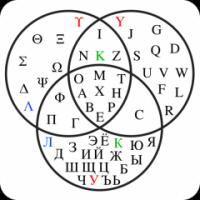Ujumbe: 19
Lugha: English
Simon Pure (Wasifu wa mtumiaji) 2 Desemba 2012 2:01:59 asubuhi
Tjeri (Wasifu wa mtumiaji) 2 Desemba 2012 6:23:53 asubuhi
Simon Pure:If I translated this as: estu nek pruntedonato nek pruntedonanto, is it understandable?Understandable and wrong, but why not:
Ne prenu prunte kaj ne prunte donu
Larmel (Wasifu wa mtumiaji) 2 Desemba 2012 9:20:21 asubuhi
tommjames (Wasifu wa mtumiaji) 2 Desemba 2012 9:53:08 asubuhi
sudanglo (Wasifu wa mtumiaji) 2 Desemba 2012 11:38:20 asubuhi
Ne prenu prunte kaj ne prunte donunothing wrong with this, but as an alternative why not
prefere, nek ŝuldanto nek ŝuldato. or
Ne pruntu al, ne pruntu de.
Tjeri (Wasifu wa mtumiaji) 2 Desemba 2012 12:38:55 alasiri
nothing wrong with this,Fortunately, these are Zam's words

matrix (Wasifu wa mtumiaji) 4 Desemba 2012 5:15:21 asubuhi
sudanglo:prefere, nek ŝuldanto nek ŝuldato. or Ne pruntu al, ne pruntu de.In the same way, “Neniam depruntu, neniam alpruntu.”
However, in this context, the use of ŝuldato is debatable since it is about a person that someone owes, not about a creditor. Ditto for pruntedonato, as Larmel pointed out.
sudanglo (Wasifu wa mtumiaji) 4 Desemba 2012 2:11:44 alasiri
However, in this context, the use of ŝuldato is debatable since it is about a person that someone owesĈu vere?
La signifo de ŝuldato en la senco de persono kiun oni ŝuldas, ŝajnas tiel malverŝajna, ke pli nature oni interpretus ĝin kiel persono al kiu oni ŝuldas.
Tute same kiel paganto kaj pagato. Tiun lastan vorton oni difinas en NPIV kiel Tiu, al kiu oni pagas
La kazo de pruntedonato ŝajnas esti malsama ĉar oni ja povas imagi ke oni prunte donas iun. Ekz. mi pruntedonos al vi mian sekretarion por la monato de julio.
English version, as requested by the Language Police
If you look up pagatao in NPIV you will find Tiu, al kiu oni pagas. By analogy ŝuldato = persono al kiu oni ŝuldas and quite reasonably so, as the idea of a person that you owe to somebody is an improbable notion, just as the idea of a person used as currency (la pagato) is improbable (mi pagis lin en vian konton!!).
The case of pruntedonato is somewhat different, You could reasonably offer to lend someone your secretary. In that case the secretary could be referred to as the pruntedonat(in)o.
Remember that all Esperanto compounds are subject to a common sense interpretation based on our knowledge of the world. This is why a manĝo is a meal (thing) in la manĝo konsistis el ..., but a falo is a fall (act), or a postlumo is a rear light on a vehicle, but taglumo is the light of day and not a torch used to illuminate the day
erinja (Wasifu wa mtumiaji) 5 Desemba 2012 2:45:41 asubuhi
matrix (Wasifu wa mtumiaji) 6 Desemba 2012 9:16:51 alasiri
sudanglo:Remember that all Esperanto compounds are subject to a common sense interpretation based on our knowledge of the world.Yes, but according to the rules of grammar, the construction ŝuldato with this meaning is problematic -- even though there is quite a unique exception of this kind in the PIV.
As a worldwide language -- spoken by people with different language and cultural backgrounds --, Esperanto should be used cautiously. I have seen so many misunderstandings with basic sentences, that I am not very optimistic about the general Esperanto level among the language speakers.
As an Esperantist, I urge to the creation of a true Esperanto culture. So, if I can agree with you -- and even encourage you --, on this website I would be more cautious: many readers have a medium or even a low Esperanto level.
However, that should not prevent creativity, nor the development of the language and its culture.





